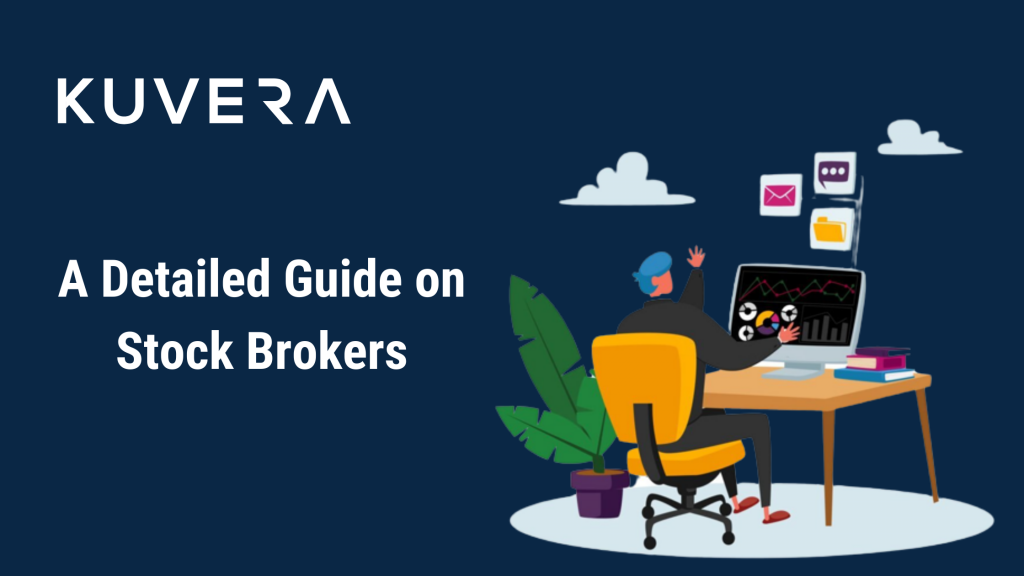Stock brokers allow traders and investors to buy and sell securities on stock exchanges. For example, if you want to purchase shares of a company, you cannot do this directly. You need to open a Demat account with a stockbroker who, on your behalf, will carry out all the transactions. Stockbrokers can be independent persons or firms that must be registered with SEBI.
These stockbrokers charge a commission or brokerage fees for providing their services. Now that you know what is a stockbroker, we will discuss other related aspects in the following sections.
Types of Brokers in Stock Market
Here are the two types of stockbrokers:
-
Full-service brokers
These brokers provide a wide range of services to their clients apart from the traditional broking services. These include advisory and research facilities for stocks, mutual funds, currencies, and other asset classes. In addition, these brokerage firms offer personalized portfolio management, financial management, and wealth management facilities to their clients. They charge very high commissions or service fees.
Full-service brokers have multiple branches and an online presence; traders can avail these facilities in a hassle-free manner.
-
Discount brokers
The gradual internet penetration has led to the flourishing of another class of brokers – discount brokers. They operate using an online platform and offer only traditional brokerage services. They do not provide customised wealth or financial management services for their clients. This is why they charge fewer commissions or fees than full-service brokers.
Generally, small investors and traders avail the services of discount brokers as they cannot afford the high charges of full-service ones. A downside associated with discount broker is they do not provide any consultation or guidance to investors. Hence, amateur traders learning the tricks of trading may lose money.
On Kuvera, you can import your entire stock portfolio, no matter which brokering platform you trade on. This will give a consolidated view of your entire portfolio making it easier for you to make smarter and quicker decisions.
History of Stock Brokerage in India
The history of Indian stock exchanges dates back to 1855, when five people assembled under a banyan tree in Horniman Circle, Mumbai, and started the investment journey. They together invested a sum of Re. 1 in buying and selling stocks. These founding fathers of India’s stock exchanges laid the foundation of the Bombay Stock Exchange (BSE), an exchange that has become the world’s eighth-largest stock exchange.
Within 5 years, this group of five people expanded to have 60 people under their umbrella. By 1874 they moved to a different location on what is now called Dalal Street. As these brokers increased in numbers, they formed an association called Native Shares and Stock Brokers Association.
Bombay Stock Exchange:
The Bombay Stock Exchange started functioning in 1875. Premchand Roy, a businessman, was a founding member of BSE. In 1957, the Government of India officially recognized BSE as India’s first stock exchange under the Securities Contracts Regulation Act.
In 1980, BSE moved to its present location on Dalal Street near Fort Area in Mumbai. The name of the current building of BSE is Phiroze Jeejeebhoy Towers, in memory of Sir Phiroze Jamshedji Jeejeebhoy, who was the chairman of BSE from 1966 till his death.
BSE launched the BSE Sensex index in 1986. It has allowed them to measure the performance of stocks accurately. This was followed by the start of derivative and options trading on BSE Sensex. The year 1995 was a very important milestone for Indian stock markets as it switched from on-the-floor trading to a complete electronic trading system. It was called BSE Online Trading – BOLT.
National Stock Exchange:
National Stock Exchange came into existence in 1992, and it started its operations in November 1994. Some of the world’s leading companies like LIC, SBI, IDFC, IFCI, etc., established NSE with the complete backing of the government. The main aim of starting NSE was to bring transparency to India’s capital markets. Today NSE is the world’s ninth-largest stock exchange in market capitalization.
Indian stock exchanges have gone from commencing their activities under a banyan tree to online stock broking operations. With the rapid technological advancement, you can trade in securities on your smartphone using online platforms.
How Has Internet Changed Trading Mechanisms?
Trading on the stock exchange has undergone a complete transformation with the advent of technology. Now, with a click of a mouse, you can buy or sell securities. Moreover, you do not have to go to the office of these stockbrokers to open your Demat account. You can do all this from the comfort of your home.
The simple and easy process of investing on online platforms has led to an enormous surge in the trading volume as more and more small retail investors can now take part in the trading process.
Final Word
Stock brokers are an important link in stock market trading. They act as a bridge between traders and the stock exchanges. However, it is important for traders to choose brokers while considering the charges and services they offer.
Frequently Asked Questions
-
What are arbitrageurs?
Arbitrageurs are traders who buy security from one stock exchange and sell the same security at a higher price on another stock exchange.
-
What is the maximum brokerage charged by a stock broker?
Brokerage commissions and fees differ from one stock broker to another. However, as per regulations of SEBI, brokers cannot charge more than 2.5% of the trading amount from their clients.
-
Are sub-brokers members of stock exchanges?
No, sub-brokers are not listed members of a stock exchange, unlike traditional brokers.
Interested in how we think about the markets?
Read more: Zen And The Art Of Investing
Watch/hear on YouTube:
Start investing through a platform that brings goal planning and investing to your fingertips. Visit Kuvera.in to discover Direct Plans and Fixed Deposits and start investing today.
#MutualFundSahiHai #KuveraSabseSahiHai!

